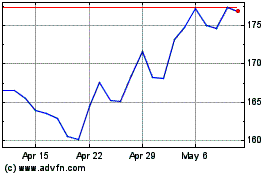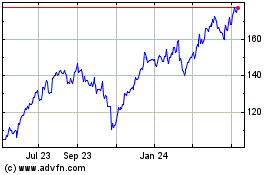This Fourth, Commit to Going Red, White and 'PINK' in the Attic: Celebrate Independence Day a Whole New Way
July 03 2007 - 12:28PM
PR Newswire (US)
Upping Estimated 60 Million Under-Insulated Attics to DOE
Guidelines Could Save 103 Million* Barrels of Oil Annually - Enough
to Fill 51 Supertankers - and Help Reduce U.S. Dependence on
Foreign Oil TOLEDO, Ohio, July 3 /PRNewswire-FirstCall/ -- With
Independence Day upon us, Owens Corning (NYSE:OC), makers of PINK
insulation, and the U.S. Department of Energy (DOE) are spreading
the word about simple, energy-efficient home improvements that can
help homeowners save money and strike oil in the attic -- 103
million barrels annually, to be precise. "Approximately 60 million
homes in the U.S. are estimated to be under insulated***," said
Gale Tedhams, director of sustainability for Owens Corning. "By
heading straight to the attic and adding insulation, homeowners can
make their homes greener, save money and conserve the energy
equivalent of 103 million barrels of oil annually -- enough to fill
51 supertankers." In addition to helping homeowners save oil and
reduce their cooling and heating costs, insulation plays another
key role in saving the planet. According to a recent study by the
McKinsey Global Institute, insulation is the single most
cost-effective way to reduce greenhouse gas emissions. "Many
Americans assume that transportation and industry are the largest
consumers of energy in the U.S., but it's actually buildings," said
Wendy Burt from the U.S. Department of Energy. "The electricity
consumed by one single home puts more carbon dioxide into the air
than two average cars. The good news is there are simple
energy-efficient upgrades we can make, such as adding insulation in
the attic and caulking windows and doors that reduce our energy
footprint and save us money." Owens Corning recommends that an
attic have between 16 and 22 inches of insulation with a minimum
total R-value of 49. To learn more about R-value and reducing home
energy consumption go to the Owens Corning energy efficiency
microsite at http://www.owenscorning.com/foryourhome/index.asp.
Site visitors can also learn about Owens Corning's suite of
fiberglass insulation products, which contain the highest level of
certified recycled content in North America and is GREENGUARD
Certified to meet the strictest standards for indoor air quality.
"Energy efficiency is truly the 'first fuel,'" said Tedhams. "A
barrel saved is two barrels earned, which means that efficient
energy is the cheapest energy anyone can buy." Homeowners who want
to reduce their home's energy footprint should consider other
energy-efficient upgrades such as: Installing a Programmable
Thermostat Why cool the house when nobody's home? A programmable
thermostat can automatically lower or raise a home's air
temperature during the day. By regulating the temperature,
homeowners can save up to 10 percent on annual heating and cooling
costs. Closing the Shades Keep windows covered with shades and
blinds during the day to prevent the sun's rays from heating the
interior of the home. In particular, cover windows facing the south
and west where the sun shines the strongest and brightest. Plugging
the Drafts Sealing the envelope of the home is the first line of
defense against drafts, so it's important to caulk and
weather-strip around all seams, cracks and openings. Pay special
attention to windows and near electrical boxes. Unwanted air
leakage alone can raise energy bills by up to 10 percent. Turning
on the Fan Simply turning on the fan can make its inhabitants feel
several degrees cooler because it circulates the air, essentially
creating a "wind chill" effect. Plus, fans use less energy than air
conditioning units and HVAC systems. Taking a Home Energy Audit
Understanding how much energy a home uses helps homeowners
determine what changes will save them the most energy and money.
For an easy home energy audit, check out the Home Report Card(R)
The quiz provides tailored recommendations on improving home energy
efficiency and can be found at
http://www.owenscorning.com/homereportcard. About Owens Corning
Owens Corning (NYSE:OC) is a world leader in building materials
systems and composite solutions. A Fortune 500 company for more
than 50 years, Owens Corning people redefine what is possible each
day to deliver high-quality products and services ranging from
insulation, roofing, siding and manufactured stone veneer, to glass
composite materials used in transportation, electronics,
telecommunications and other high-performance applications. Founded
in 1938, Owens Corning is a market-leading innovator of glass fiber
technology with sales of $6.5 billion in 2006 and 19,000 employees
in 26 countries. Additional information is available at
http://www.owenscorning.com/. *103 million represents the number of
barrels saved annually if all under- insulated U.S. homes insulated
to DOE standards. **The McKinsey Global Institute
(http://www.mckinseyquarterly.com/article_abstract.aspx?ar=1911&L2=3).
*** Estimated 60 million under-insulated homes in 2006 based upon a
2003 Harvard School of Public Health study, The public health
benefits of insulation retrofits in existing housing in the United
States. Media Contact: Media Contact: Kerry Desberg Chris Grams
Owens Corning GolinHarris (419) 248-5939 (312) 729-4364 DATASOURCE:
Owens Corning CONTACT: Kerry Desberg of Owens Corning,
+1-419-248-5939; or Chris Grams of GolinHarris, +1-312-729-4364,
for Owens Corning Web site: http://www.owenscorning.com/
Copyright
Owens Corning (NYSE:OC)
Historical Stock Chart
From Jun 2024 to Jul 2024

Owens Corning (NYSE:OC)
Historical Stock Chart
From Jul 2023 to Jul 2024
